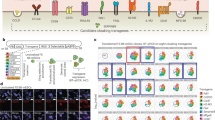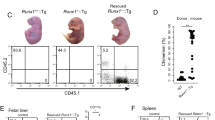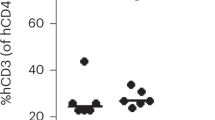Abstract
Hematopoietic stem cells have been successfully employed for tolerance induction in a variety of rodent and large animal studies. However, clinical transplantation of fully allogeneic bone marrow or blood-borne stem cells is still associated with major obstacles, such as graft-versus-host disease or cytoreductive conditioning-related toxicity. Here we show that when rat embryonic stem cell-like cells of WKY origin are injected intraportally into fully MHC-mismatched DA rats, they engraft permanently (>150 days) without supplementary host conditioning. This deviation of a potentially alloreactive immune response sets the basis for long-term graft acceptance of second-set transplanted WKY cardiac allografts. Graft survival was strictly correlated with a state of mixed chimerism, which required functional thymic host competence. Our results provide a rationale for using preimplantation-stage stem cells as vehicles in gene therapy and for the induction of long-term graft acceptance.
This is a preview of subscription content, access via your institution
Access options
Subscribe to this journal
Receive 12 print issues and online access
$209.00 per year
only $17.42 per issue
Buy this article
- Purchase on Springer Link
- Instant access to full article PDF
Prices may be subject to local taxes which are calculated during checkout




Similar content being viewed by others
References
George, J.F., Goldstein, D.R. & Thomas, J.M. Donor bone marrow and transplantation tolerance: historical perspectives, molecular mechanisms and future directions (review). Int. J. Mol. Med. 4, 475–482 (1999).
Weissman, I.L. Translating stem and progenitor cell biology to the clinic: barriers and opportunities. Science 287, 1442–1446 (2000).
Ildstad, S.T. & Sachs, D.H. Reconstitution with syngeneic plus allogeneic or xenogeneic bone marrow leads to specific acceptance of allografts or xenografts. Nature 307, 168–170 (1984).
Wekerle, T. et al. Allogeneic bone marrow transplantation with co-stimulatory blockade induces macrochimerism and tolerance without cytoreductive host treatment. Nature Med. 6, 464–469 (2000).
Wekerle, T. et al. Anti-CD154 or CTLA4Ig obviates the need for thymic irradiation in a non-myeloablative conditioning regimen for the induction of mixed hematopoietic chimerism and tolerance. Transplantation 68, 1348–1355 (1999).
Sykes, M., Szot, G.L., Swenson, K.A. & Pearson, D.A. Induction of high levels of allogeneic hematopoietic reconstitution and donor-specific tolerance without myelosuppressive conditioning. Nature Med. 3, 783–787 (1997).
Sharabi, Y. & Sachs, D.H. Mixed chimerism and permanent specific transplantation tolerance induced by a nonlethal preparative regimen. J. Exp. Med. 169, 493–502 (1989).
Hess A.D., Fischer, A.C. & Beschorner, W.E. Effector mechanisms in cyclosporine A-induced syngeneic graft-versus-host disease. J. Immunol. 145, 526–533 (1990).
Ferrara, J.L., Levy, R. & Chao, N.J. Pathophysiologic mechanisms of acute graft- vs .-host disease (review). Biol. Blood Marrow Transplant. 5, 347–356 (1999).
Reisner, Y. & Martelli, M.F. Transplantation tolerance induced by 'mega dose' CD34+ cell transplants. Exp. Hematol. 28, 119–127 (2000).
Reisner, Y. & Martelli, M.F. Tolerance induction by 'megadose' transplants of CD34+ stem cells: a new option for leukemia patients without an HLA-matched donor [In Process Citation]. Curr. Opin. Immunol. 12, 536–541 (2000).
Vacchio, M.S. & Jiang, S.P. The fetus and the maternal immune system: pregnancy as a model to study peripheral T-cell tolerance. Crit. Rev. Immunol. 19, 461–480 (1999).
Medawar, P.B. Some immunological and endocrinological problems raised by the evolution of viviparity in vertebrates. Symp. Soc. Exp. Biol. 7, 320–338 (1954).
Tafuri, A., Alferink, J., Moller, P., Hammerling, G.J. & Arnold, B. T cell awareness of paternal alloantigens during pregnancy. Science 270, 630–633 (1995).
Zhou, M. & Mellor, A.L. Expanded cohorts of maternal CD8+ T-cells specific for paternal MHC class I accumulate during pregnancy. J. Reprod. Immunol. 40, 47–62 (1998).
Bianchi, D.W. Current knowledge about fetal blood cells in the maternal circulation. J. Perinat. Med. 26, 175–185 (1998).
Wekerle, T. & Sykes, M. Mixed chimerism as an approach for the induction of transplantation tolerance. Transplantation 68, 459–467 (1999).
Shizuru, J.A., Weissman, I.L., Kernoff, R., Masek, M. & Scheffold, Y.C. Purified hematopoietic stem cell grafts induce tolerance to alloantigens and can mediate positive and negative T cell selection. Proc. Natl. Acad. Sci. USA 97, 9555–9560 (2000).
Zinkernagel, R.M., Callahan, G.N., Klein, J. & Dennert, G. Cytotoxic T cells learn specificity for self H-2 during differentiation in the thymus. Nature 271, 251–253 (1978).
Fink, P.J. & Bevan, M.J. H-2 antigens of the thymus determine lymphocyte specificity. J. Exp. Med. 148, 766–775 (1978).
French, L.E. et al. Fas and Fas ligand in embryos and adult mice: ligand expression in several immune-privileged tissues and coexpression in adult tissues characterized by apoptotic cell turnover. J. Cell. Biol. 133, 335–343 (1995).
Steller, H. Mechanisms and genes of cellular suicide. Science 267, 1445–1449 (1995).
Griffith, T.S., Brunner, T., Fletcher, S.M., Green, D.R. & Ferguson, T.A. Fas ligand-induced apoptosis as a mechanism of immune privilege [see comments]. Science 270, 1189–1192 (1995).
Grusby, M.J., et al. Mice lacking major histocompatibility complex class I and class II molecules. Proc. Natl. Acad. Sci. USA 90, 3913–3917 (1993).
Restifo, N.P. Not so Fas: Re-evaluating the mechanisms of immune privilege and tumor escape. Nature Med. 6, 493–495 (2000).
O'Connell, J. et al. Immune privilege or inflammation? Insights into the Fas ligand enigma. Nature Med. 7, 271–274 (2001).
Allison, J., Georgiou, H.M., Strasser, A. & Vaux, D.L. Transgenic expression of CD95 ligand on islet beta cells induces a granulocytic infiltration but does not confer immune privilege upon islet allografts. Proc. Natl. Acad. Sci USA 94, 3943–3947 (1997).
Kang, S.M. et al. Fas ligand expression in islets of Langerhans does not confer immune privilege and instead targets them for rapid destruction. Nature Med. 3, 738–743 (1997).
Li, X.K. et al. Prolonged survival of rat liver allografts transfected with Fas ligand-expressing plasmid. Transplantation 66, 1416–1423 (1998).
Swenson, K.M. et al. Fas ligand gene transfer to renal allografts in rats: effects on allograft survival. Transplantation 65, 155–160 (1998).
George, J.F. et al. An essential role for Fas ligand in transplantation tolerance induced by donor bone marrow. Nature Med. 4, 333–335 (1998).
Liechty, K.W. et al. Human mesenchymal stem cells engraft and demonstrate site-specific differentiation after in utero transplantation in sheep. Nature Med. 6, 1282–1286 (2000).
Iannaccone, P.M., Taborn, G.U., Garton, R.L., Caplice, M.D. & Brenin, D.R. Pluripotent embryonic stem cells from the rat are capable of producing chimeras. Dev. Biol. 163, 288–292 (1994).
Brenin, D., Look, J., Hübner, N., Levan, G. & Iannaccone, P. Correction. Dev. Biol. 185, 124–125 (1997).
Ono, K. & Lindsey, E.S. Improved technique of heart transplantation in rats. J. Thorac. Cardiovasc. Surg. 57, 225–229 (1969).
Kampinga, J. et al. Vascular thymus transplantation in rats. Technique, morphology and function. Transplantation 50, 669–678 (1990).
Fändrich, F. et al. Different in vivo tolerogenicity of MHC class I peptides. J. Leukoc. Biol. 65, 16–27 (1999).
Cordell, J.L. et al. Immunoenzymatic labeling of monoclonal antibodies using immune complexes of alkaline phosphatase and monoclonal anti-alkaline phosphatase (APAAP complexes). J. Histochem. Cytochem. 32, 219–229 (1984).
Solter, D. & Knowles, B.B. Monoclonal antibody defining a stage-specific mouse embryonic antigen (SSEA-1). Proc. Natl. Acad. Sci. USA 75, 5565–5569 (1978).
Acknowledgements
This work was supported in part by a grant of the Interdisziplinäre Forschergruppe Transplantationsmedizin (IFTM) of the University of Kiel and partly by a grant from the Deutsche Forschungsgemeinschaft (Za 131/7-3). We thank P. Boll, K. Broetzmann, P. Krüger, K.-A. Y. Ott, I. Schellhorn and M. Hauberg for excellent technical support.
Author information
Authors and Affiliations
Corresponding author
Ethics declarations
Competing interests
The authors declare no competing financial interests.
Rights and permissions
About this article
Cite this article
Fändrich, F., Lin, X., Chai, G. et al. Preimplantation-stage stem cells induce long-term allogeneic graft acceptance without supplementary host conditioning. Nat Med 8, 171–178 (2002). https://doi.org/10.1038/nm0202-171
Received:
Accepted:
Issue Date:
DOI: https://doi.org/10.1038/nm0202-171
This article is cited by
-
TIGIT+ iTregs elicited by human regulatory macrophages control T cell immunity
Nature Communications (2018)
-
Harnessing the immunological properties of stem cells as a therapeutic option for diabetic nephropathy
Acta Diabetologica (2014)
-
CD70–CD27 ligation between neural stem cells and CD4+ T cells induces Fas–FasL-mediated T-cell death
Stem Cell Research & Therapy (2013)



